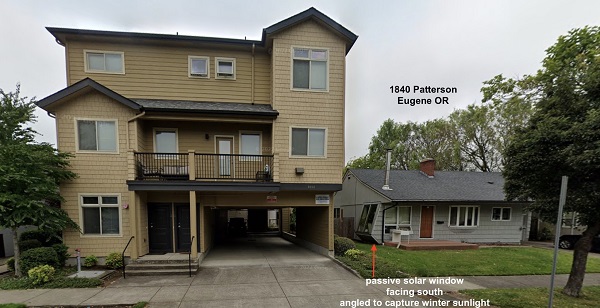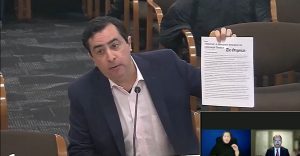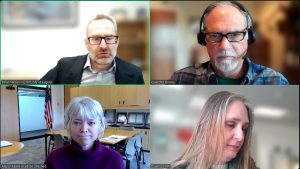Why EWEB wants smart meters
10 min read
Screenshot
Mark Robinowitz: My name’s Mark Robinowitz. I’ve lived in Eugene for a quarter century and have been interested in energy policy since I sat in my mom’s car in 1973 during the Saudi oil embargo. That got me interested as a kid in energy availability, where it comes from, and all the related concerns about that.
As an adult, I have worked to challenge nuclear power, to challenge highways, including the West Eugene Parkway, which was canceled in 2007. And I’m very concerned about not just that fossil fuels are polluting and causing climate change, but they are incredibly concentrated and depleting since they are non-renewable.
[00:00:49] For 34 years, I have personally used solar photovoltaic panels, which are great, but I’ve also learned from using them on my house that they are not going to replace our current consumption (pun intended). There’s certainly a rush to install more wind farms and solar panels, but the largest single energy source on the electric grid in the United States, both on the west and the east grids and Texas, is natural gas.
[00:01:24] Natural gas was never intended a couple decades ago to become a dominant power source for the grid. It was a beneficiary of the rise of fracking over the last 15 or so years. Natural gas, until fracking, had peaked; it peaked in 1973 and has declined about two-thirds since. But the rise of fracking generated a small ocean of natural gas that surpassed that peak and so it enabled utilities to massively increase the amount of natural gas, especially as coal went through its own peak and decline in part due to climate concerns, but also because the best coal is gone.
[00:02:10] We’ve been mining coal since the 1800s and the easy-to-get coal is now air pollution. It’s no longer in the ground. So natural gas is a victim of its success because we’ve become very dependent on gas to run the power grid, not just in terms of volume, but the grid requires constant generation to match the demand that all of us are using.
[00:02:37] So last night it was chilly and there was more electric heat, more electricity for it, so the gas generation went up. It’s now morning and it’s going to warm up today, so it would be less gas for generation. We’re in the longer daylight time of year so it will be a little bit less lighting, but factories have also started up for the day, and all of these and countless other factors have to be juggled in real time by grid operators.
[00:03:09] And solar and wind are awesome ways to generate electricity, but when there is sunlight and when there is wind doesn’t always match when we want to turn on the power. And that is an inherent physical difficulty that doesn’t have an easy solution. And the grid doesn’t store electricity; to store electricity with batteries is expensive and difficult. And you can’t, as far as we know, run a grid entirely on variable sources. Generation is what it is.
[00:03:47] In the Northwest, we are blessed with a lot of large hydroelectric facilities, which you can throttle up and down, which helps a lot for regional balance of the grid. It also causes damage to fish habitat and other problems. But apart from the ecological impacts of dams, we’re not building any more large hydropower dams. The best sites were dammed decades ago. And we’re even thinking about maybe dismantling some of the dams, some of the smaller dams have already commenced being dismantled, but the large megadams on the Columbia, our regional backbone of the electric grid, but they too work in association with natural gas facilities, both in the Northwest and the rest of the Western power grid.
[00:04:39] EWEB, our local utility, claims that most of the electricity we use in Eugene is from renewable, i.e. hydro sources, but they failed to mention that the western power grid that we’re all part of, has more natural gas than hydropower to generate.
[00:05:01] Well, one of the things that I was taught when I first learned how to use solar panels a third of a century ago is to cut your demand. There’s a lot of wasteful practices and there’s also efficiency and learning to go without. Why do we light up billboards at night? Why is that even legal? So there’s so many low-hanging fruit that we could adopt for cutting consumption that we don’t.
[00:05:30] And these principles apply on a society-wide level, not just an individual household. In the 1970s, there was much more of an emphasis, especially in the environmental movement at the time, of conservation, learning to evaluate what was really needed, and not just for electricity, but everything: How we design our cities, higher mileage for cars, public transportation instead of cars.
[00:05:59] There’s a long list and a lot of these practices have been mostly rejected by our society. And we are now facing, when fracking subsides due to geological factors, of not having enough energy to support our over-consumptive way of living. And there’s the potentials for massive political and psychological shocks once that happens, which we’re totally unprepared for at any level.
[00:06:32] There’s a lot of controversy about meeting demand. In the Northwest there are efforts to revive the nuclear power industry to provide baseload electricity for the power grid and there are even some who believe that because it’s not a direct use of fossil fuel—it’s an indirect use of fossil fuel—that this is somehow good for lowering the risk of climate change.
[00:07:01] But reactors emit huge amounts of heat. Mining uranium is as renewable as mining oil or natural gas or coal. And there’s major health problems from uranium mines, nuclear reactor operations, and then the Russian roulette aspect of what happens if there’s a reactor meltdown that doesn’t dump everything into the ocean, but it radiates farmland downwind. It’s the most dangerous way to boil water.
[00:07:28] You also have in many utilities, and EWEB is only one of them, the rollout of automated meters, which make reading meter use much easier for utilities, but it also makes it easy for the utility to impose rolling brownouts and blackouts if there’s not enough electricity to go around.
[00:07:49] In California they’ve had times when there hasn’t been enough regional power to go around, that whole neighborhoods get shut down, but it can also be done more targeted so if everyone had say, electric hot water heaters, ou could throttle them off for an hour at a time and most people wouldn’t even notice that it had been done if that was targeted that way.
[00:08:16] Because the electric lights in your home are certainly more dramatic if they were to shut off without warning, but they don’t use very much power compared to, for example, electric hot water heater or centralized heat in your home. And so a more targeted way for temporary shortages could be done with minimal disruption.
[00:08:43] The problem is more what happens as natural gas generation is not as possible in a longer sense, when there’s physically not as much natural gas. And right now, today, that’s not an immediate concern, but fracked wells don’t last long. Yes, they’re polluting, yes, they’re expensive, but they’re also short-term, compared with conventional wells.
[00:09:12] In Oregon, we had one small natural gas field near Astoria, and it didn’t generate that much, and what was there has already been mined. It’s just above zero now. We don’t have any oil. There was a very small coal field, and it’s gone. We have the wrong geology. Geology matters when talking about fossil fuels. We also had one small uranium mine out in the desert near Lakeview and now it’s just a toxic waste site with the uranium tailings. They’ve actually had problems with forest fires in the vicinity, but that mine is long gone. Nobody’s mining there anymore.
[00:09:56] Finite energy sources are not just a bad idea, they can’t continue. And the rhetoric about sustainability distracts from the fact that we have built this huge house of cards that’s based on resources that are finite. That’s what sustainability is really all about.
[00:10:16] This is a concern not just for the hottest day of the year when everyone has their air conditioners on or the coldest day of the year when everyone has their electric heaters on, but it’s also a concern for availability. Do we have some drought years where there’s not enough water for the dams? Do we see fracked gas peak and decline? You know, that is an inevitability, it’s just a question of when. (Fracking, I’m not in favor of fracking, I support it being banned, but there would be a price to pay for banning it before it runs out due to depletion.)
[00:10:53] There are still choices we can make today, but the easy options are in the past. Many experts have suggested that the tipping point was when our society heard the efficiency message from President (Jimmy) Carter, and for the most part, our society went, ‘No, we don’t really want to do that. We don’t want to have to learn to conserve. We don’t want a more efficient car. We don’t want to think about not using cars,’ and a lot of it’s baked in now.
[00:11:27] In Eugene, for example, we used to be able to collect sunlight if you put solar electric or solar hot water panels on your roof. And there are solar panel systems I’ve seen in Eugene where the new McTownhouses that are sprouting up all over parts of town have actually shaded out solar-powered homes in town. So we’re going backwards.
[00:11:52] And this is why you have desperate ideas like, “Oh, well, we’re going to revive the nuclear power industry,” or other crazy ideas that are a huge threat to future generations.
[00:12:05] Wind—and wind is variable. When the wind is blowing, it’s awesome. There’s no fuel. The wind just blows the turbines, and you get the power almost for free. There’s installation, there’s some maintenance, but that doesn’t always synchronize when we want the power. This is why the utilities really love natural gas, because natural gas you can throttle up and down at will.
[00:12:34] Coal, which we don’t have a lot of in the Northwest anymore, generates a lot of base load power, but it’s sort of a binary thing. It’s either on or it’s off. And the last coal burner in Oregon got shut down a couple of years ago with Boardman in Eastern Oregon, but it was replaced by a similarly-sized natural gas burner, which just sits there and burns natural gas all day long.
[00:13:00] Now the dams are an awesome way to generate power if you ignore the fish habitat issues, but there’s only so much that a dam can generate, and with climate change the long-term prospect for dams may be a lot less than they are today. There are dams in California and Nevada that have had generation issues in the last couple of years. They had a good winter this year and the year before, but two years ago there were dams that had to shut down in California because there wasn’t enough water to generate.
[00:13:34] So it’s good to look at how to run the grid in a more decentralized, with a higher percentage of renewables, but the real issue is to learn to live with less, and we waste so much power that to cut our power in half wouldn’t be that difficult. We don’t have to live like cavemen but we’re not even doing the easy stuff to reduce power. Why do we have lights aimed at the sky at night? That’s not even lighting up roads or walkways or things that people can actually use. If electricity cost more, we might be more conscious of what we’re doing.
[00:14:15] On energy policy, Eugene is the epicenter of greenwashing, the false claim of environmentalism, and they are remarkably impervious to any reality checks. For them, they have bought into EWEB’s sweet lies that, ‘Oh, we are sustainable energy in Eugene, and we’re going to phase out fossil fuels and not have to change the way we live.’ And it’s a very seductive message. It’s not terribly correct, but it’s certainly a more palatable message to pretend that these things are reality than: ‘We’re reaching the reckoning for ignoring the energy crisis over the last half century.’
[00:15:01] Eugene is in the middle of a massive gentrification program and expanding the city onto more farmland and buildings that are energy-consumptive, and pretending we can increase our use of electricity without using fossil fuels. I mean, Eugene’s largest capital program right now is to widen the Beltline Highway to up to 16 lanes where it crosses the river, and there’s no public discussion of that whatsoever. It was actually approved a year and a half ago by the Federal Highway Administration.
[00:15:36] The only time it’s been mentioned in the Eugene Weekly is when I had a letter to the editor to complain. They didn’t think it was worthy of a story because it would shatter the illusion that Eugene is the capital of Ecotopia and, ‘We’re so ecological and we’re going to solve climate change, you know, so move here and buy a home.’
[00:15:55] I have two websites that I run that cover these topics in great detail. The first is a local discussion, SustainEugene.org, and it talks about EWEB and regional energy and what it took to stop the West Eugene Parkway tearing up the West Eugene wetlands 15 years ago, which has unconventional history of actual environmental policies in Eugene.
[00:16:26] And on a broader national and global level, PeakChoice.org, which talks a lot about ecological responses to finite fossil fuels and the inherent paradox that we’re damned if we drill and we’re damned if we stop, because we’re are dependent on it for everything.





